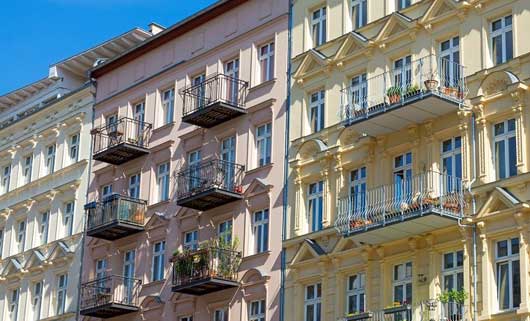House prices up 5.84% during the year to Q1 2022
Germany’s housing prices continue to rise, though at a slower pace, amidst a shortage of residential supply. The average price of apartments rose by 5.84% during the year to Q1 2022, following y-o-y rises of 7.68% in Q4 2021, 8.96% in Q3, 11.68% in Q2 and 9.59% in Q1. This past year saw the lowest annual growth since Q3 2018. On a quarterly basis, house prices increased by a meagre 0.34% in Q1 2022.
Germany’s housing prices have been rising continuously in the past eight years. House prices are up by more than 70% from Q1 2014.

Strong demand, supply shortage
Demand has been buoyed by ultra-low borrowing costs, urbanization, healthy household finances, and strong economic growth. Years of very low interest rates have made it easy for households to move to larger, more expensive homes and for first-time buyers to get on the property ladder. In recent years, the migration crisis has added to the already strong demand.
However in the first quarter of 2022, dwelling permits fell by 3.6% y-o-y to 92,507 units, following annual growth of 3.4% in 2021 and 2.2% in 2020, according to the Federal Statistical Office (Destatis).
Rents, rental yields: moderate yields at 2.9% to 3.7%
Berlin apartment costs are around €4,991per sq. m.
Germany: city centre apartment, buying price, monthly rent (120 sq. m.)
| Buying price | Rate per month | Yield | |
| Berlin | € 598,920 | € 1,493 | 2.99% |
| Frankfurt | € 544,680 | € 1,678 | 3.70% |
| Munich | € 942,360 | € 2,243 | 2.86% |
Recent news: Germany’s economy grew by 3.8% in Q1 2022 from a year earlier, its fourth consecutive quarter of y-o-y growth after it was devastated by the Covid-19 pandemic in 2020. Yet on a quarterly basis, Europe’s biggest economy grew by a minuscule 0.2% in Q1 2022, as the Ukraine crisis began to have an increasing impact, according to Destatis.
Recently, the German government slashed its growth forecast for 2022 to 2.2% from its initial projection of a 3.6% expansion, as Russia’s invasion of Ukraine, the continuing Covid-19 crisis, as well as sanctions and high energy prices take a toll on output. The European Commission takes a more pessimistic view, projecting the German economy to have meagre growth of 1.6% this year, following 2.9% growth in 2021.